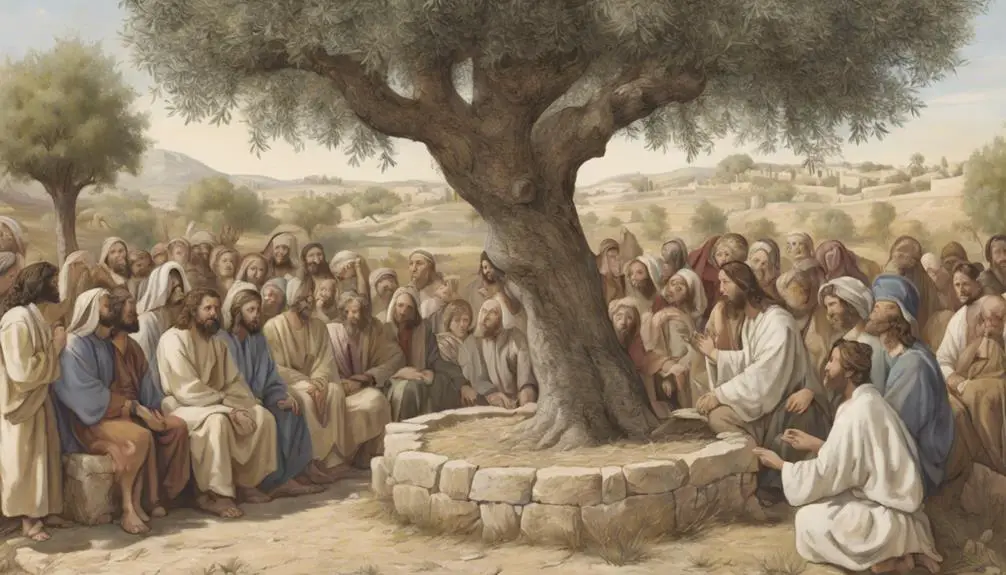An exploration of biblical passages addressing adultery, and how they shape our modern understanding of faith and morality.

What Bible Verse Talks About Adultery
As the old adage goes, 'actions speak louder than words,' but have you ever considered what the Bible specifically says about adultery?
In several passages, the Bible offers wisdom, instruction, and even warnings about this significant topic. For example, Exodus 20:14 succinctly states, 'You shall not commit adultery.'
Meanwhile, Matthew 5:27-28 takes a deeper look into the subject, suggesting that even lustful thoughts can be considered adulterous. How can these verses shape our understanding of morality and faith today? Let's explore this together.
Key Takeaways
- Exodus 20:14, the Seventh Commandment, explicitly prohibits adultery, valuing the sanctity of marriage bonds.
- Proverbs 6:32 frames adultery as a self-destructive act that lacks wisdom and erodes moral integrity.
- Matthew 5:27-28, Jesus' teaching, expands the definition of adultery to include lustful thoughts and intent, demanding purity in actions and thoughts.
- Hebrews 13:4 highlights the divine judgment faced by adulterers, emphasizing the importance of keeping the marriage bed pure and honorable.
Understanding Adultery in Biblical Context

To fully comprehend adultery in a Biblical context, you need to delve into the ancient Hebrew culture, laws, and societal norms that shaped the Scriptures. Adultery, as it's understood in the Bible, isn't merely a casual affair or a one-night stand. It's a profound violation of the covenant—a sacred, binding agreement—between a man and a woman.
In ancient Hebrew society, adultery wasn't just a private matter between two individuals. It was a public affair that disrupted the societal order, breaking the trust that bonded communities together. The act was severely condemned and punishable by death.
The Hebrew word for adultery, “na'aph,” is a verb that means to commit unfaithfulness or to act treacherously. It implies a deep, intentional betrayal, not just of one's spouse, but also of one's community and God. Thus, in the Biblical narrative, adultery is more than a sexual misdemeanor; it's a breach of faith, an act of disloyalty against God's ordained order.
Exodus 20:14 – The Seventh Commandment

Building upon this understanding of adultery's gravity in Biblical times, you'll find its clear prohibition in Exodus 20:14, widely known as the Seventh Commandment. This verse succinctly states, 'You shan't commit adultery,' indicating that marital fidelity isn't just a societal expectation, but a spiritual mandate.
The Seventh Commandment's brevity doesn't detract from its weight. It's a cornerstone of moral law, implying that the sanctity of marriage bonds is paramount. You'll note that it's not merely about physical acts; it also encompasses emotional infidelity.
In the Biblical context, adultery isn't just a breach of trust between spouses but a transgression against God. The commandment's placement within the Decalogue, right between 'You shan't murder' and 'You shan't steal,' underlines its severity. It's not merely a guideline; it's a divine edict, reflecting God's ideal for human relationships.
The consequences of disregarding this commandment are significant, both spiritually and societally. It disrupts the harmony of the family unit, a microcosm of societal order. By understanding the Seventh Commandment, you gain insight into the Biblical perspective on adultery: it's not just an individual failing, but a violation of God's law and societal order.
Proverbs 6:32 – Wisdom's Warning

Delving deeper into the Bible's teachings on adultery, you'll encounter Proverbs 6:32, a poignant warning from the voice of wisdom. This verse states, 'But a man who commits adultery has no sense; whoever does so destroys himself.' Here, the writer of Proverbs, King Solomon, presents adultery not just as an offense against another person or societal norms, but as a self-destructive act, a direct assault on one's own wisdom and understanding.
You'll note that this verse is framed in the context of wisdom literature, a genre of biblical writing that provides moral and practical advice for living. Solomon emphasizes the foolishness of the adulterer, who lacks sense, and the self-inflicted harm that results from such action. It's not merely about the act itself; it's about the profound lack of judgment and wisdom that leads to it.
Moreover, the use of 'destroys himself' highlights the severe consequences of adultery. It's not just a fleeting mistake; it's a catalyst for destruction. Solomon's words serve as a stern warning. Adultery doesn't just harm others; it's an act of self-sabotage, eroding one's own moral integrity and inviting chaos into one's life.
Matthew 5:27-28 – Jesus' Teaching

In the New Testament, Jesus expands upon the concept of adultery in Matthew 5:27-28, imparting a revolutionary perspective that challenges traditional understanding. 'You have heard that it was said, 'You shan't commit adultery.' But I tell you that anyone who looks at a woman lustfully has already committed adultery with her in his heart.' This teaching deepens the moral implications of the act.
Jesus doesn't merely condemn the physical act of adultery, but extends the sin to the mental sphere, to the realm of thought and desire. He's effectively saying that the act of adultery begins in the heart, with lustful intent. This teaching elevates the moral standard, making it not just about our actions, but also about our thoughts and intentions.
In essence, Jesus is underscoring the importance of purity in both thought and deed. The implication here is that righteousness isn't just about avoiding certain actions, but cultivating a heart and mind that's free of lustful desires. This interpretation of adultery encompasses not just outward behavior, but the inward state of the heart. It's a call to integrity, holiness, and purity that penetrates deeper than mere actions.
Consequences of Adultery: Hebrews 13:4

While Jesus' teaching in Matthew illuminates the moral implications of adultery, let's now turn our attention to Hebrews 13:4 which presents the consequences of this act. This verse states, 'Marriage should be honored by all, and the marriage bed kept pure, for God will judge the adulterer and all the sexually immoral.' This verse, steeped in the theology of sanctity, clearly communicates the gravity of adultery.
In the context of this verse, it's important to note that the writer of Hebrews isn't merely recommending a moral code. Instead, it's a divine directive, a law that God himself enforces. It's the idea of divine judgment that underscores the severity of the act. The Greek word for 'judge' used here is krino, which implies a decisive, definitive judgment. It's not a slap on the wrist, but a serious consequence for a serious transgression.
The verse also emphasizes the sanctity of marriage. It's not just about avoiding sin, but honoring what's holy. The marriage bed is a sacred space that symbolizes the exclusive intimacy between a married couple. To violate that sanctity is to invite divine judgment. This is the weighty consequence of adultery as presented in Hebrews 13:4.
Conclusion
In conclusion, you've seen that the Bible explicitly addresses adultery. Exodus 20:14 states it as a commandment, while Proverbs 6:32 warns of its destructiveness. Jesus, in Matthew 5:27-28, broadens the definition to include lustful thoughts.
Lastly, Hebrews 13:4 underlines the severity of its consequences. Understanding these verses can guide you in avoiding such transgressions, promoting a life of moral integrity and faithfulness that aligns with God's teachings.



Sign up